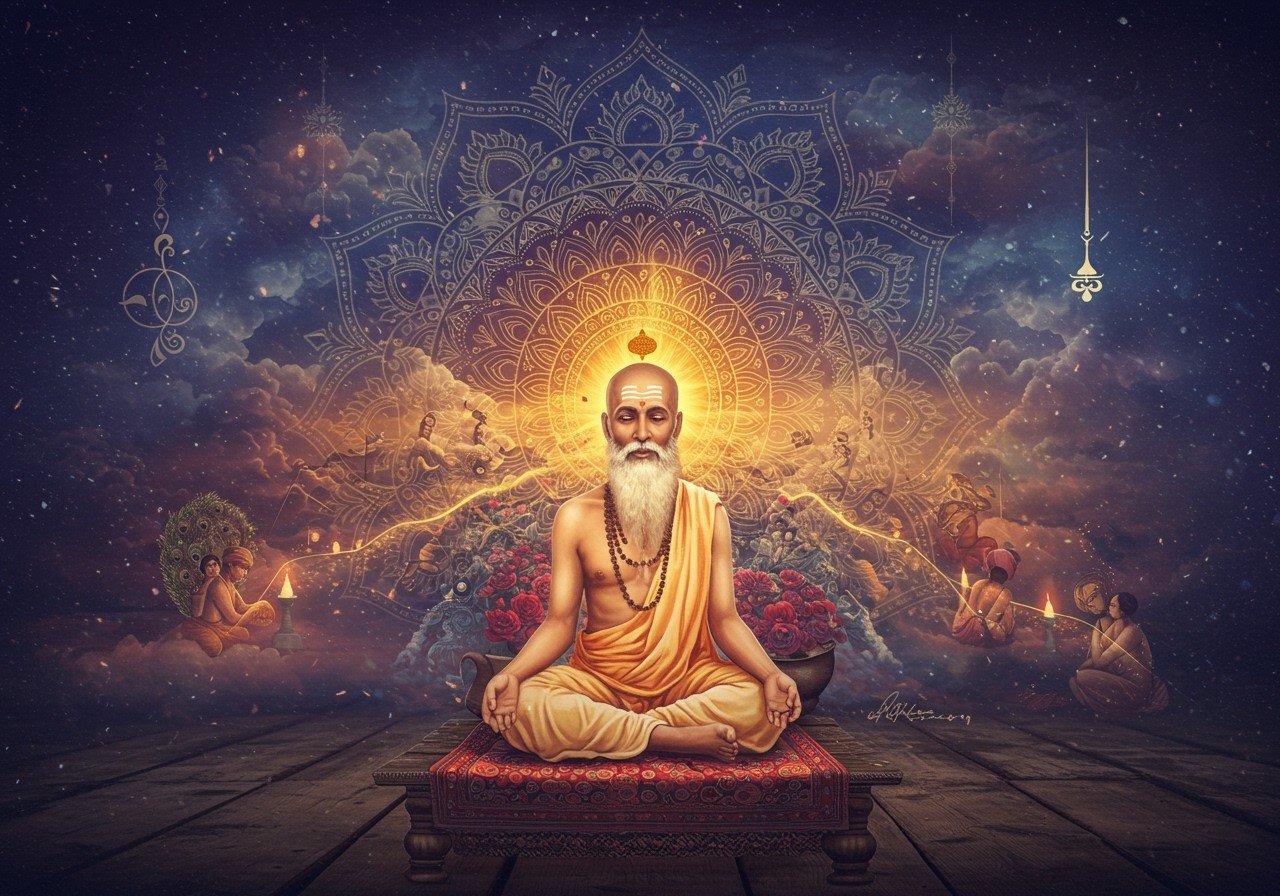
Kabir’s teachings hold a special place in Indian spirituality, with a core focus on love and devotion. His poetry offers profound insights into these themes, delving beneath the surface to explore a deep spiritual connection. Kabir’s work remains culturally significant, keeping Indian spiritual traditions alive while resonating with contemporary seekers. This blog serves as a guide for those seeking a deeper understanding of Kabir’s teachings, using online platforms to connect with his wisdom. We will explore key aspects of his philosophy on love, devotion, and spiritual growth.
The Meaning of Bhakti (Devotion) in Kabir’s Poetry
Bhakti, a Sanskrit term, signifies devotion or love. It represents a deep, personal expression of love and adoration for the divine. It’s more than just religious rituals; it’s an intense connection from the heart, fostering a sense of closeness with the divine. Kabir’s poetry emphasizes bhakti as a transformative path.
- Love and Adoration: Bhakti is more than just ritual; it is a heartfelt expression of love for the divine. This involves complete surrender and faith, leading to profound inner transformation and a deep sense of connection.
- Surrender and Faith: Bhakti involves surrendering to a higher power, transcending the ego, and embracing humility. It requires unwavering faith and trust in the divine’s wisdom and love, leading to spiritual awakening.
- Inner Transformation: Through bhakti, individuals experience inner peace and spiritual growth. They cultivate qualities like compassion, forgiveness, gratitude, and selflessness, leading to a more fulfilling life.
- Universality: Bhakti transcends all barriers, welcoming people of all backgrounds to connect with the divine. This can manifest through various forms of expression such as devotional songs, prayers, rituals, or selfless service.
Dive deeper into the world of Bhakti with Krishna Bhajans.
Kabir’s Unique Perspective on Love
Kabir’s concept of love transcends the ordinary, extending beyond human relationships to encompass a profound reverence for the divine. He emphasizes the importance of a personal relationship with God, cultivated through inner experience rather than outward rituals.
- Divine Love: Kabir’s understanding of love goes beyond human affection. It embodies a deep reverence for God, achieved through inner experience rather than external rituals, fostering a personal connection with the divine.
- Selfless and Unconditional: True love, according to Kabir, is characterized by selflessness and unconditional acceptance. Giving without expecting anything in return strengthens bonds and builds profound trust.
- Inner Purity: Kabir highlights the significance of inner purity as the foundation for genuine love. Cleansing the heart of negativity like jealousy and anger allows true affection to flourish.
- Unifying Force: Kabir viewed love as a powerful force for unity, bridging divides and fostering understanding among people. Rejecting hatred and embracing universal brotherhood are central to his teachings.
- Beyond the Physical: Kabir’s poetry often speaks of a love that transcends the physical realm, emphasizing spiritual connection. Inner purity, compassion, and selflessness are at the heart of this love, extending beyond romantic love to encompass friends, family, and the divine. It emphasizes a deep, inner connection with the divine, rather than outward displays of affection.
The Intertwining of Love and Devotion
In Kabir’s philosophy, love and devotion are intertwined, each enhancing the other. Love acts as the pathway to the Supreme, dissolving the illusion of separation and guiding individuals toward their true nature.
- Path to the Supreme: Kabir believed that love is the primary means of attaining the Supreme. True love dissolves the illusion of separation between the individual and the divine, awakening individuals to their true nature.
- Dissolving the Illusion of Separation: Kabir saw love as a powerful force capable of dissolving the illusion of separation between individuals and the divine, revealing their inherent unity. Love is the bridge connecting the human and the divine.
- Devotion as Love: Kabir taught that devotion, when expressed through sincere love, allows the soul to break free from ignorance and merge with the formless God. This deep connection transcends ritual and focuses on the inner transformation through love.
Explore the epic narrative of Ramcharitmanas, a testament to devotion and love.
Key Aspects of Kabir’s Teachings
Kabir’s teachings stand apart due to their unique emphasis on a formless God, inner divinity, and the rejection of rigid rituals. His emphasis on equality and social justice continues to resonate today.
- Formless God: Kabir advocated for devotion to a formless God (Nirguna Bhakti). He emphasized the unity of God and the equality of all human beings, rejecting idol worship and elaborate rituals.
- Inner Divinity: Kabir stressed the importance of realizing one’s inner divinity. He believed that God resides within each individual, a concept that transcends the boundaries of organized religion. This inner divinity is the true source of connection with the divine.
- Rejection of Rituals: Kabir challenged the blind adherence to religious customs, emphasizing the importance of inner spirituality and genuine love for all beings above outward displays of piety.
- Equality: Kabir challenged social norms and advocated for equality among all, irrespective of caste or religious background. He believed in the inherent dignity of every individual, promoting inclusivity and respect for all.
Kabir’s poetry encourages a love that goes beyond the ordinary, connecting us to the divine spark within and fostering a sense of unity and equality among all beings. Explore a range of spiritual products at poojn.in to enhance your spiritual journey.
Deepen your understanding of devotion with the Hanuman Chalisa.
Bring home the divine presence with a Radha Krishna Bigraha.
Enhance your spiritual practice with a Marble Dust Shiva Lingam.


